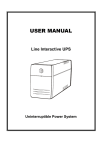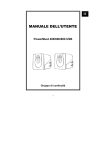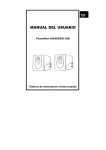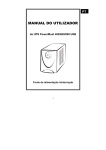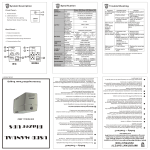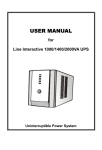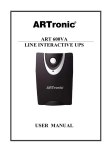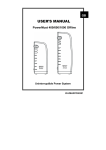Download Mustek Power Must 400 User manual
Transcript
EN USER MANUAL PowerMust 400/600/800 USB 2nd Edition, 2005 Uninterruptible Power System 28-2BLA000133 1 IMPORTANT SAFETY INSTRUCTIONS SAVE THESE INSTRUCTIONS – This manual contains important instructions for PowerMust 400/600/800 USB Series that should be followed during installation and maintenance of the UPS and batteries. 2 CONTENTS 1. Introduction 1 2. Safety – CAUTION! 1-2 3. System Description 3 4. Installation and Operation 4-6 5. Trouble Shooting 6 6. Specification 7 614-05790-04 3 PowerMust 400/600/800 USB User Manual 1. Introduction This UPS is specially designed for Personal Computer with multi-functions. Its light weight, compact design perfect fits to the limited working environment. The line of UPS is equipped with boost and buck AVR to stabilize input voltage range. It is also built-in with DC start function. This function enables the UPS to be started up without AC power supplied. Although it’s a small UPS, it’s equipped with Smart RS-232 Communication Port to offer users more benefits. The download software helps users monitor UPS inside status. The main features of PowerMust 400/600/800 USB UPS are listed below: z z z z z z z z z Microprocessor control guarantees high reliability. Equipped with Boost and Buck AVR. Built-in RS-232/USB Communication Ports. Free Software (Please check Software Installation.) DC Start Function. Auto restart while AC recovery. Auto charging battery even though UPS is off. Provides AC overload protection. Provides Modem/Phoneline surge protection. . 2. Safety – Caution z z z z z z This UPS utilizes voltages that may be hazardous. Do not attempt to disassemble the unit. The unit contains no user serviceable parts. Only factory service personnel may perform repairs. Internal battery voltage is 12Vdc. Connection to any other type of receptacle other than a two-pole, three-wire grounded receptacle may result in shock hazard as well as violate local electrical codes. In the event of an emergency, press the OFF button and disconnect the power cord from the AC power supply to properly disable the UPS. Do not allow liquids or any foreign object to enter the UPS. Do not place beverages or any other liquid-containing vessels on or near the unit. This unit intended for installation in a controlled environment (temperature controlled, indoor area free of conductive contaminants). Avoid installing the UPS in locations where there is standing or running water, or excessive humidity. 4 z z z z z z z z z z z z z z Do not plug the UPS input into its own output. Do not attach a power strip or surge suppressor to the UPS. Do not attach non-computer-related items, such as medical equipment, life-support equipment, microwave ovens, or vacuum cleaners to UPS To reduce the risk of overheating the UPS, do not cover the UPS’ cooling vents and avoid exposing the unit to direct sunlight or installing the unit near heat emitting appliances such as space heaters or furnaces. Unplug the UPS prior to cleaning and do not use liquid or spray detergent. Do not dispose of batteries in a fire as they may explode. Do not open or mutilate the battery or batteries. Released electrolyte is harmful to the skin and eyes. It may be toxic. A battery can present a risk of electrical shock and high short circuit current. The following precautions should be observed when working on batteries: 1) Remove watches, rings, or other metal objects from the hands. 2) Use tools with insulated handles. 3) Wear rubber gloves and boots. 4) Do not lay tools or metal parts on top of batteries. 5) Disconnect charging source prior to connecting or disconnecting batteries terminals. Servicing of batteries should be performed or supervised by personnel knowledgeable of batteries and the required precautions. Keep unauthorized personnel away from batteries. When replacing batteries, replace with the same number and type of sealed lead-acid battery. This pluggable type A equipment with battery already installed by the supplier is operator installable and may be operated by laymen. During the installation of this equipment it should be assured that the sum of the leakage currents of the UPS and the connected loads does not exceed 3.5mA Attention, hazardous through electric shock. Also with disconnection of this unit from the mains, hazardous voltage still may be accessible through supply from battery. The battery supply should be therefore diconnected in the plus and minus pole at the connectors of the battery when maintenance or service work inside the UPS is necessary. The mains socket outlet that supplies the UPS shall be installed near the UPS and shall be easily accessible. 5 3. System Description Front panel: 1. Power Switch 2. LED Indicators – For 400/600 Model: For 800 Model: AC Mode: Green LED lighting AC Mode: Green LED on Battery Mode: Green LED flashing Battery Mode: Yellow LED flashing Fault: Red LED on Back Panel-1. Output receptacles 2. AC input with AC fuse 3. Modem/Phoneline Surge Protection 4. RS-232 Communication Port 5. USB Port 6 4. Installation and operation Installing the UPS is as easy as following the steps shown. Be aware of the Power Switch must be kept in the “ON” position, otherwise, the UPS will be disabled and your equipment will not be protected during a power failure. 1. Inspection Remove the UPS from its packaging and inspect it for damage that may have occurred during shipping. If any damage is discovered, repack the unit and return it to the place of purchase. 2. Placement Install the UPS unit in any protected environment that provides adequate airflow around the unit, and is free from excessive dust, corrosive fumes and conductive contaminants. Do not operate your UPS in an environment where the ambient temperature or humidity is high. On the other hand, place the UPS away from the monitor at least 20cm to avoid interference. 3. Charging This unit is shipped from the factory with its internal battery fully charged, however, some charge may be lost during shipping and the battery should be recharged prior to use. For 400/600 models, plug the unit into an appropriate power supply and allow the UPS to charge fully by leaving it plugged in for at least 8 hours with no load (no electrical devices such as computers, monitors, etc.) connected. For 800 Model, please charge at least 4 hours. 7 4. Computer Connection Connect one computer-related device into each of the power receptacles supplied on the back of the UPS. 5. Modem/Phoneline Connection Plug incoming internet line into the “In” socket at the back of the UPS. Use one more internet line cable and plug one end of the internet line cable to the “Out” socket at the back of the UPS. Plug the other end to the modem input socket as shown below. 6. Serial Cable Connection To allow for unattended system shutdown for your operating system, connect the RS-232 serial cable as per diagram below. For the USB serial cable, just simply plug into the UPS and PC and it will be auto detected. 7. Turn On/Off PowerMust 400/600/800 USB series will be turned on automatically at first plug-in. At this moment, press power switch lightly to turn off the UPS. To turn on the UPS unit, press the power switch lightly. To turn off the UPS unit, press the power switch again. 8 8. DC Start Function DC Start Function enables UPS to be started up when AC utility power is not available and battery is fully charged. Just simply press the power switch to turn on the UPS. 9. Software Installation – WinPower (FOR WINDOWS O/S) 1. Insert the installation CD into CD-ROM drive and then follow the on-screen instructions. If there no screen shows when inserting the CD after 1 minute, please execute setup.exe for initiating installation software. 2. Enter Serial No: 511C1-01220-0100-478DF2A to install the software. When your computer restarts, the WinPower software will appear as a green plug icon located in the system tray, near the clock. 5. Trouble Shooting Symptom No LED display on the front panel. Possible Cause 1. Missing battery. 2. Battery defect. Alarm buzzer beeps Overload of the UPS. continuously when AC supply is normal. When power failure, back-up time is shorten. Mains normal but LED is flashing. Remedy 1. 400/600 models: Charge battery up to 8 hours. 800 model: Charge battery up to 4 hours. 2. Replace with the same type of battery. Verify that the load matches the UPS capability specified in the specs. 1. Overload of the UPS. 1. Remove some noncritical load. 2. Battery voltage is too 2. 400/600 models: Charge low. battery 8 hours or more. 800 model: Charge battery 4 hours or more. 3. Battery defect due to 3. Replace with the same type high temperature of battery. operation environment, or improper operation to battery. 1. Fuse is blown. 1. Replace the same type of fuse. 2. Power cord is loose. 2. Reconnect the power cord properly. If any abnormal situations occur that are not listed above, please call service people immediately. 9 6. Specification MODEL CAPACITY VA/W INPUT Voltage PowerMust PowerMust 600 PowerMust 800 400 USB USB USB 400VA/240W 600VA/360W 800VA/480W 220/230/240VAC Voltage Range 162~268VAC Frequency OUTPUT 45-65 Hz (Auto Sensing) Voltage Voltage Regulation (Batt. Mode) Frequency 220/230/240VAC ±10% 50Hz or 60Hz Frequency Regulation (Batt. Mode) +/-1 Hz Output Waveform Modified Sinewave Battery Type & 12V4.5 Ah x BATTERY 12V7AH x 1 12V9AH x 1 Number 1 Back up Time at a PC load with 15” Monitor 8-30 minutes (typical) 4 hours to 90% 8 hours to 90% after complete after complete Recharge Time discharge discharge TRANSFER TIME Typical 2-6ms AC Mode Green LED lighting Backup Mode Green LED flashing Yellow LED flashing Fault No LED light Red LED lighting Backup Mode Sounding every 10 seconds Low Battery Sounding every second AUDIBLE ALARM Overload Sounding every 0.5 second Battery Replacement Sounding every 2 seconds Fault Continuously sounding PROTECTION Full Protection Discharge, overcharge, and overload protection Dimension (mm), PHYSICAL 330X100X140 DXWXH WEIGHT Net Weight (kgs) 6.5 Operating 0- 40°C, 0-90 % Relative humidity (non-condensing) ENVIRONMENT Environment INDICATOR Noise Level INTERFACE Smart RS-232 Less than 40dB Support windows 95/98/NT/2000/XP, Novell, and Linux 10










